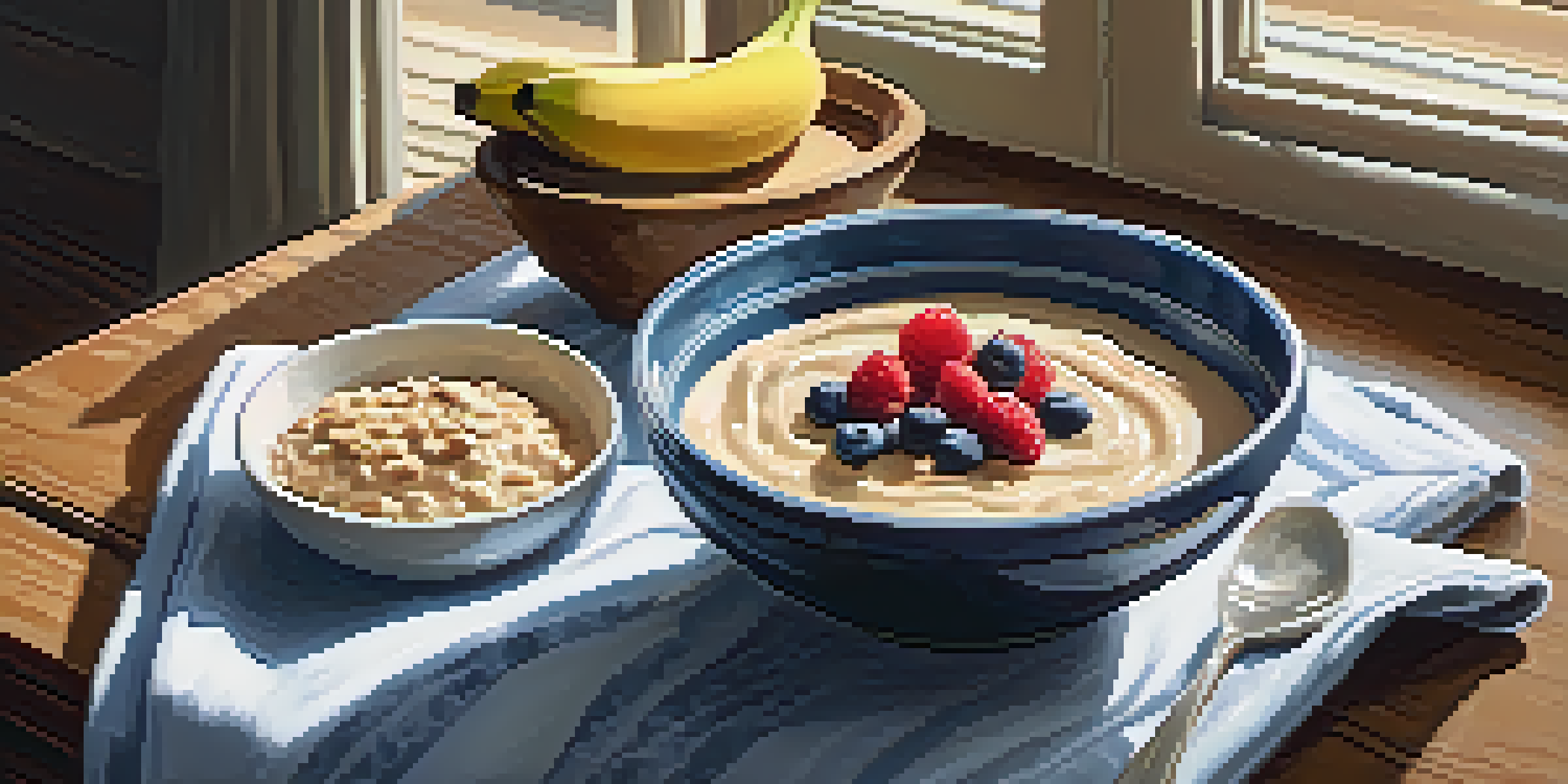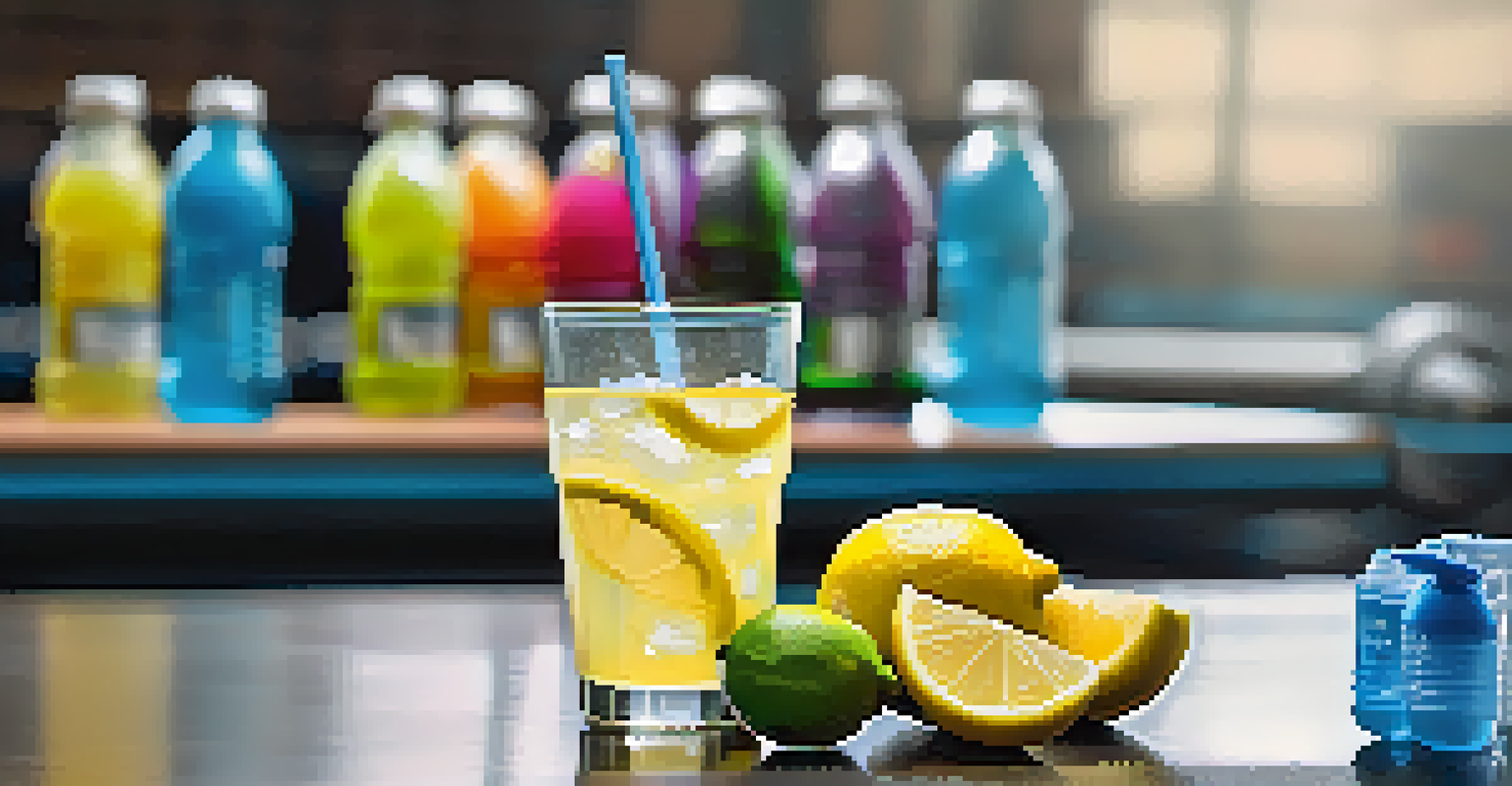Meal Timing Strategies for Martial Artists Before Training

Understanding the Importance of Meal Timing
Meal timing plays a crucial role in optimizing performance for martial artists. Consuming the right foods at the right time can enhance energy levels and improve endurance during training sessions. This concept isn't just about what you eat; it's also about when you eat it.
You are what you eat, so don’t be fast, cheap, easy, or fake.
For martial artists, timing meals around training can help prevent fatigue and ensure that your body has the necessary fuel to perform at its best. Think of your body as a high-performance car; it needs the right kind of fuel and timely refills to hit the racetrack effectively.
By understanding meal timing, martial artists can better align their nutritional habits with their training schedules, leading to improved performance and recovery. This awareness can make a significant difference in achieving training goals.
The Pre-Training Meal: What to Include
A pre-training meal should be rich in carbohydrates and moderate in protein while being low in fat and fiber. Carbohydrates provide the quick energy your muscles need, while protein aids in muscle repair and growth. For example, a banana with a scoop of peanut butter or a bowl of oatmeal with berries can be excellent choices.

It's important to consider the timing of your pre-training meal. Eating it about 1 to 3 hours before training ensures that your body has enough time to digest and convert the food into usable energy. This way, you can avoid feeling sluggish during your workout.
Meal Timing Boosts Performance
Eating the right foods at the right times enhances energy levels and endurance for martial artists.
Experimenting with different meal combinations and timing can help you find what works best for your body. Keep track of how you feel during training after different meals to optimize your pre-training nutrition.
Hydration: A Key Component of Meal Timing
Hydration is often overlooked but is a vital part of meal timing strategies. Dehydration can lead to decreased performance, so it's essential to maintain fluid balance before training. Aim to drink water or a sports drink during your pre-training meal to keep your hydration levels in check.
The difference between a successful person and others is not a lack of strength, not a lack of knowledge, but rather a lack in will.
A good rule of thumb is to consume at least 16-20 ounces of water 1-2 hours before your workout. Additionally, sipping on water in the 30 minutes leading up to training can further enhance hydration. Think of it as topping off a tank before a long drive; you want to prevent any stops along the way.
If you’re training intensely or for extended periods, consider electrolyte-rich beverages to replenish lost minerals. Staying hydrated not only supports your performance but also aids recovery post-training.
Timing Your Snacks for Optimal Energy
In addition to main meals, snacks can play a significant role in meal timing strategies. A small, nutrient-dense snack can provide an energy boost without weighing you down. Options like a protein shake or a handful of nuts can be perfect for a quick pick-me-up.
Timing your snack about 30-60 minutes before training can help maintain energy levels without causing discomfort. This is especially beneficial if you haven’t had a meal in a while or if you train on an empty stomach.
Hydration is Crucial
Maintaining proper hydration before training supports performance and recovery.
Experimenting with different snack options will help you discover what fuels your body best. Just like finding the right gear in martial arts, the right snacks can enhance your training experience and performance.
Listening to Your Body: Individual Needs
Every martial artist’s body is different, which means meal timing strategies should be personalized. Pay attention to how your body responds to different foods and meal times. Some might find that they perform better on an empty stomach, while others need a hearty meal to feel energized.
Listening to your body can help you identify what works best for you. For instance, if you notice you feel sluggish after eating a large meal too close to training, it may be time to adjust your timing or portion sizes.
It's important to create a flexible meal plan that accommodates your training schedule and personal preferences. This way, you can optimize your performance while still enjoying your meals.
Post-Training Nutrition: The Recovery Phase
While this article focuses on pre-training meal timing, post-training nutrition is equally important. Consuming a balanced meal or snack after training helps replenish energy stores and aids recovery. Foods rich in protein and carbohydrates, like a chicken wrap or a protein smoothie, can be excellent choices.
Eating within 30-60 minutes after training allows your body to recover efficiently. This is often referred to as the 'anabolic window,' a time when your muscles are primed to absorb nutrients and repair themselves.
Personalize Your Nutrition Strategy
Listening to your body and adjusting meal timing can optimize performance and enhance your training experience.
Incorporating post-training meals into your routine will not only help you recover faster but also prepare your body for future training sessions. Consistency in both pre and post-training nutrition can be key to your overall success as a martial artist.
Common Mistakes to Avoid
As with any strategy, there are common pitfalls to avoid when it comes to meal timing for martial artists. One major mistake is skipping meals before training, which can lead to feeling weak and fatigued. Remember, your body needs fuel to perform, so don’t deprive it.
Another mistake is eating heavy meals too close to training sessions. This can cause discomfort and hinder performance. Instead, aim for lighter meals or snacks that provide energy without weighing you down.

Being aware of these common mistakes can help you make better choices in your nutrition strategy. By fine-tuning your meal timing, you can enhance your training and overall performance.